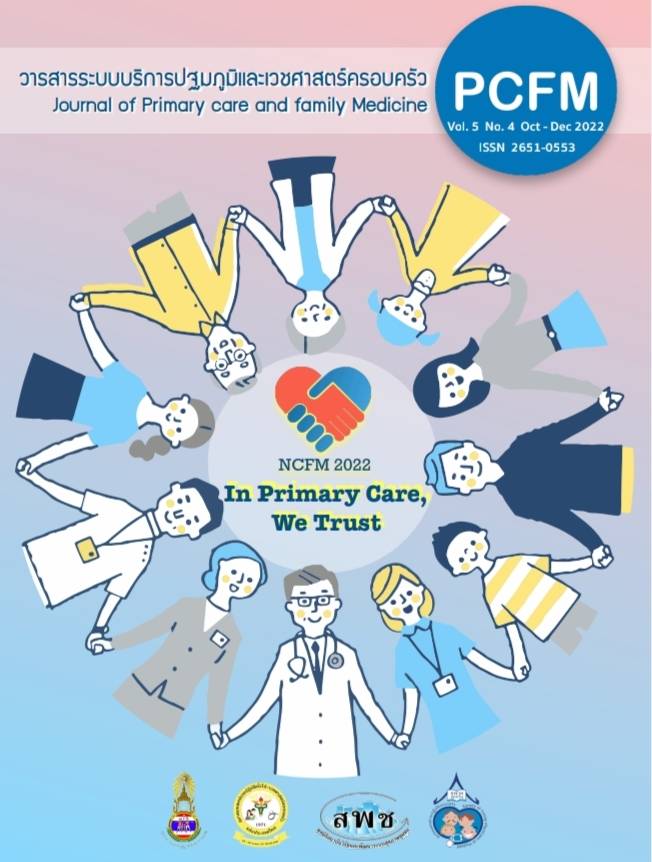การตั้งโจทย์วิจัยด้วยคำถามสำคัญ: แก่นสำคัญในการออกแบบและดำเนินการวิจัย
Main Article Content
บทคัดย่อ
หลายทศวรรษที่ผ่านมาข้อมูลขนาดใหญ่เป็นที่สนใจของนักวิชาการอย่างกว้างขวาง เพื่อนำไปขับเคลื่อนเทคโนโลยีทั้งเชิงวิทยาศาสตร์และไม่ใช่วิทยาศาสตร์ ซึ่งเวชปฏิบัติอิงหลักฐานมักนิยมใช้อ้างอิงประกอบการตัดสินใจขั้นเบื้องต้น อย่างไรก็ตามในทางปฏิบัติ การรักษาโรคต้องปรับเปลี่ยนไปให้เหมาะสมกับผู้ป่วยแต่ละราย เนื่องจากมีความเฉพาะตัวของภาวะโรค ความซับซ้อน และผลแทรกซ้อนอื่น ๆ โดยปัจจัยส่วนบุคคล อาทิเช่น เพศ วิถีชีวิต พันธุกรรม การเข้าถึงบริการรักษา ซึ่งเป็นตัวแปรสำคัญที่ต้องพิจารณาประกอบในการตัดสินใจในเวชปฏิบัติอิงหลักฐาน ปัจจุบันการนำผลงานวิจัยเป็นข้อมูลสนับสนุนการรักษาทางการแพทย์เป็นอีกปัจจัยที่สำคัญ นำไปสู่การเพิ่มความแม่นยำในศาสตร์ทางการแพทย์ หรือการตัดสินใจ ความเหมาะสมของรูปแบบการรักษา ชนิดและปริมาณยาที่ใช้ แนวทางการติดตามผลลัพธ์ให้บริการ และการรักษาแบบทางเลือก ซึ่งสิ่งสำคัญที่ต้องใช้ประกอบการให้พิจารณานั้น ได้แก่ วิจารณญาณ/สัญชาตญาณ ประสบการณ์ทางคลินิก และหลักฐานทางวิชาการ ดังนั้นการตั้งคำถามงานวิจัยที่เหมาะสมจึงเป็นสิ่งที่สำคัญในการช่วยเติมเต็มความองค์รู้ที่ขาดหาย จากกระบวนการวิจัย เช่น การวิเคราะห์จากฐานข้อมูลเดิมที่มีอยู่ การค้นหาความองค์รู้ใหม่ หรือการนำเสนอสมมุติฐานสำหรับการทำวิจัยในอนาคต ด้วยเหตุนี้การมีคำถามการวิจัยที่ดี จึงเป็นขั้นตอนพื้นฐานแรกที่จะช่วยให้นักวิจัยกำหนดทิศทางของงานวิจัย การบรรลุเป้าหมาย และลดทอนข้อมูลที่ไม่จำเป็นและใช้ระยะเวลาในการทำวิจัยให้เกิดประโยชน์สูงสุด รวมถึงการเชื่อมการทำงานร่วมกันระหว่าง เวชปฏิบัติอิงหลักฐาน เวชปฏิบัติคลินิก แนวทางเวชปฏิบัติ และการให้การรักษารายบุคคลอย่างเหมาะสม
Article Details

อนุญาตภายใต้เงื่อนไข Creative Commons Attribution-NonCommercial-NoDerivatives 4.0 International License.
เนื้อหาและข้อมูลในบทความที่ลงตีพิมพ์ในวารสาร PCFM ถือเป็นข้อคิดเห็นและความรับผิดชอบของผู้เขียนบทความโดยตรง ซึ่งกองบรรณาธิการวารสารไม่จำเป็นต้องเห็นด้วยหรือร่วมรับผิดชอบใด ๆ
บทความ ข้อมูล เนื้อหา รูปภาพ ฯลฯ ที่ได้รับการตีพิมพ์ลงในวารสาร PCFM ถือเป็นลิขสิทธิ์ของวารสาร PCFM หากบุคคลหรือหน่วยงานใดต้องการนำทั้งหมดหรือส่วนหนึ่งส่วนใดไปเผยแพร่ต่อหรือเพื่อกระทำการใด ๆ จะต้องได้รับอนุญาตเป็นลายลักษณ์อักษรจากวารสาร PCFM ก่อนเท่านั้น
เอกสารอ้างอิง
Yusuf S, Collins R, Peto R. Why do we need some large, simple randomized trials? Stat Med. 1984;3(4):409-22.
Allen EM. Why are research grant applications disapproved? Science. 1960;132(3439):1532-4.
Aslam S, Emmanuel P. Formulating a researchable question: A critical step for facilitating good clinical research. Indian journal of sexually transmitted diseases. 2010;31(1):47-50.
Bragge P. Asking good clinical research questions and choosing the right study design. Injury. 2010;41 Suppl 1:S3-6.
Naccarella L, Buchan J, Brooks P. Evidence-informed primary health care workforce policy: are we asking the right questions? Aust J Prim Health. 2010;16(1):25-8.
Price CP, Christenson RH. Ask the right question: a critical step for practicing evidence-based laboratory medicine. Ann Clin Biochem. 2013;50(Pt 4):306-14.
Brian Haynes R. Forming research questions. J Clin Epidemiol. 2006;59(9):881-6.
Cummings SR, Browner WS, Hulley SB. Conceiving the research question and developing the sutdy plan. In Hulley SB, Cummings SR, Browner WS, Grady DG, Newman TB, editors. Designing clinical research. 4 ed. Philadelphia: Lippincott Williams & Wilkins; 2013. p. 14-22.
Diabetes Prevention Program Research G. Long-term effects of lifestyle intervention or metformin on diabetes development and microvascular complications over 15-year follow-up: the Diabetes Prevention Program Outcomes Study. Lancet Diabetes Endocrinol. 2015;3(11):866-75.
Agoritsas T, Vandvik P, Neumann I, Rochwerg B, Jaeschke R, Hayward R, et al. Finding Current Best Evidence. Chapter 5. In: Guyatt G, Rennie D, Meade M, Cook D, editors. Users’ Guides to the Medical Literature: A Manual for Evidence-Based Clinical Practice 3rd ed. New York: McGraw-Hill; 2015.
Richardson WS, Wilson MC, Nishikawa J, Hayward RS. The well-built clinical question: a key to evidence-based decisions. ACP J Club. 1995;123(3):A12-3.
Fineout-Overholt E, Johnston L. Teaching EBP: asking searchable, answerable clinical questions. Worldviews Evid Based Nurs. 2005;2(3):157-60.
Browner WS, Newman TB, Hulley SB. Getting ready to estimate sample size: Hypotheses and underlying principles. In: Hulley SB, Cummings SR, Browner WS, Grady DG, Newman TB, editors. Designing clinical research. 4 ed. Philadelphia: Lippincott Williams&Wilkins; 2013. p. 43-53.


